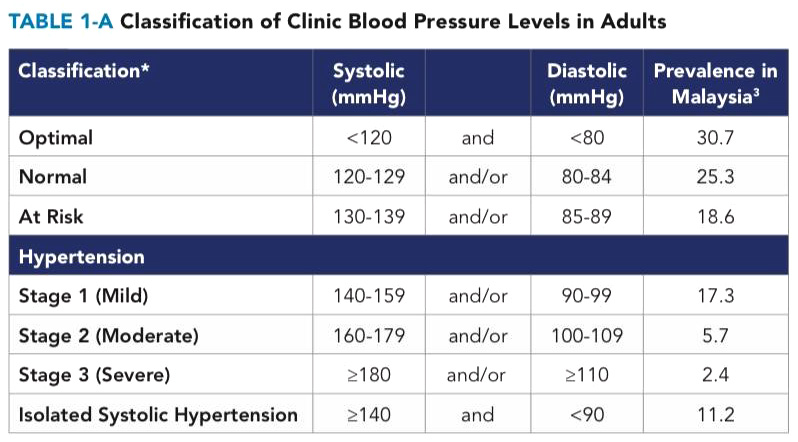Hypertension (HPT) or high blood pressure, is a well-known silent killer. Defined as consistent high blood pressure (BP) with systolic blood pressure above 140 mmHg and/or diastolic blood pressure above 90 mmHg. Diagnosis is made when the elevated blood pressure is recorded on two separate visits two weeks apart, at the very least.
It is one of the most common non-communicable diseases alongside Type 2 Diabetes Mellitus.
Prevalence increases significantly with age although nowadays there is an increase in diagnosis in younger age groups. Studies show that almost 50% of patients are unaware of them having HPT and only about 40% of patients on treatment achieve the target BP. In Malaysia, the prevalence of HPT in people aged 18 years and above is around 35 to 40 per cent!
Risk factor of heart diseases
Hypertension is one of the main risk factors for cardiovascular disease especially stroke and heart disease. An early diagnosis leads to optimal treatment to prevent unwanted complications and in turn, reduce the rate of mortality or death.
Primary HPT is also known as essential HPT. This constitutes more than 90 per cent of all cases of HPT diagnosis. The causes are multifactorial and associated with genetic or a family history of HPT. Apart from advanced age as a major risk factor, obesity and environmental stress also play important roles in increasing risks of HPT.
Essential hypertension can be present in both a benign state, in which onset is gradual and prolonged. Or in a malignant state, where the onset of abrupt and short dramatic BP increases. Without urgent intervention, the latter can be fatal.
Secondary hypertension
Secondary hypertension results from an identifiable cause such as hormonal or endocrine diseases, kidney disease or heart conditions. This makes up the five to 10 percent of prevalence for hypertension diagnosis. Thus in these diseases, treatment of the underlying disease will be able to control patients’ blood pressure.
Stage of hypertension
HPT is known as the silent killer because, usually there will be no significant symptoms especially at the early stages. As the disease advances and blood pressure increases, without treatment patients will start to develop symptoms such as headache, fatigue, dizziness, palpitations, flushing and blurring of vision.
Upon diagnosis the treating doctor will perform routine blood and urine tests, electrocardiogram (ECG) and if needed chest X-ray. These are to see the extent of hypertension, organ damage and also screening of other associated diseases.
In some cases especially with borderline HPT, non pharmacologic therapy can be considered for first line treatment of hypertension such as sodium restriction, weight loss for overweight individuals, exercise, caffeine restriction and cessation of smoking and/or alcohol.
In patients with hypertension, weight loss is shown to be one of the most beneficial to reduce BP. A 3-4 kg reduction would achieve improvement of systolic BP 4-5mmHg. WHO recommends reduction of salt intake less than 5g per day (one teaspoon salt) in assisting BP control.
In patients with excessive environmental stress, relaxation and breathing techniques are also shown to be beneficial. If these lifestyle modifications fail then the patient will eventually require medications.
Pharmacological treatment primarily involves the usage of a variety of anti hypertensive methods, which work using different pathways in the human body. There are few different groups of medications to treat hypertension. Often than not patients will require a combination of 2 or 3 medications to achieve good BP control in trying to reduce complications and ultimately mortality.
After starting medications, the next step is to treat the blood pressure to reach the target goal. Aim to achieve the target within 3-6 months.
- <80 years old target <140/90
- >80 years old target <150/90
- High risk individuals target <130/80
Regular follow up is needed and intervals will be individualised according to risk, blood pressure and control, plus types of medications used. Once BP is well controlled, a follow up is recommended at least every 6 months.
One of the common myths of HPT is that once you are subjected to medications, it has to be continued lifelong. In fact in patients with very good BP control, doctors can consider to titrate down the medications and in some cases stop it completely, especially if aggressive lifestyle modifications can be made. Of course some criteria is needed in this category, such as, patients in stage 1 HPT should have good BP control at least for more than 1 year, besides continuing and maintaining a healthy lifestyle.
However we can’t avoid some common complications of uncontrolled hypertension that can lead to death including coronary heart disease, congestive heart failure, ischaemic or hemorrhagic stroke and kidney failure. These events will usually affect the patient greatly in terms of quality of life. Another important complication from long standing uncontrolled HPT is retinopathy or hypertensive eye disease causing blurred vision. Thus, it is also recommended for hypertensive patients to undergo eye screening.
In summary, a blood pressure check at every opportunity is highly recommended. Anyone above 18 should at least have 1 (one) BP recorded. People with higher risks such as family history of HPT and obesity need more frequent monitoring. The usage of electronic blood pressure devices is acceptable. Blood pressure measurement has to be optimum including using the right cuff size and must be done in a relaxed manner.
Home blood pressure monitoring in high risk and hypertensive patients is highly recommended as this will help the treating doctor in managing hypertension better. Early diagnosis of hypertension is very important as this allows early treatment and control of blood pressure. This will reduce the number of patients with acute or long term complications and make our nation a healthier one, besides reducing the economic burden in the health system.
 Dr Muhammad Shahruddin
Dr Muhammad Shahruddin
Consultant Internal Medicine Physician
Columbia Asia Hospital – Puchong


